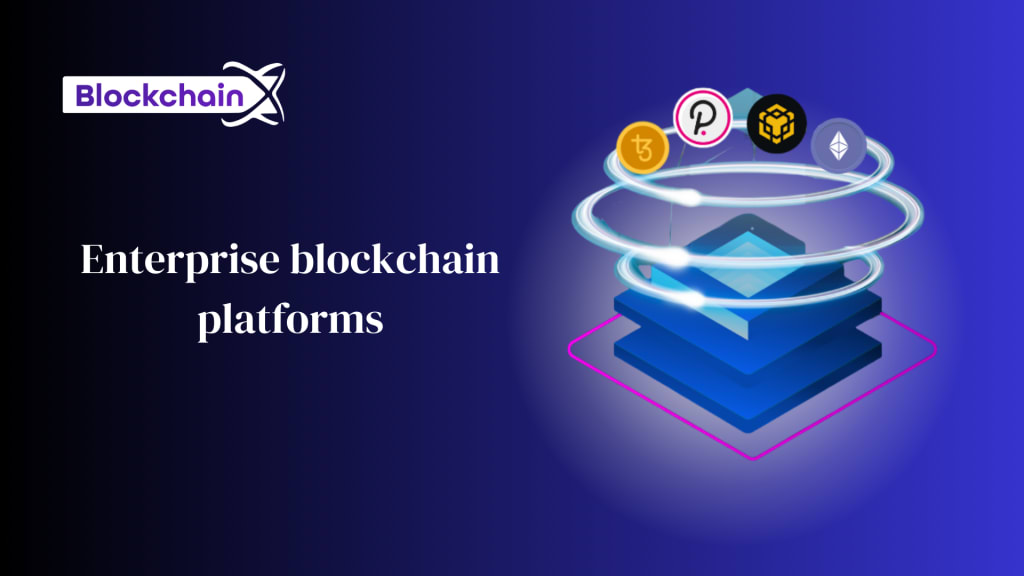Enterprise blockchain platforms
Enterprise blockchain platforms

Enterprise blockchain platforms
Exploring Blockchain Platforms: A Comparative Analysis
Blockchain technology has emerged as a transformative force across various industries, promising enhanced security, transparency, and efficiency in data management and transactions. Several blockchain platforms have been developed to cater to diverse needs, each offering unique features and capabilities. In this article, we delve into the characteristics, use cases, and distinctions of prominent blockchain platforms, including Blockchainx, Hyperledger Fabric, Ethereum, Corda, Quorum, and Ripple.
1. Blockchainx:
Blockchainx is a versatile blockchain platform designed to facilitate secure and transparent transactions across industries. With its decentralized architecture and consensus mechanisms, Blockchainx ensures immutability and integrity of data, making it suitable for applications requiring high levels of trust and auditability. Its modular design allows for customization and scalability, accommodating various use cases from supply chain management to financial services.
2. Hyperledger Fabric:
Developed under the Linux Foundation's Hyperledger umbrella, Hyperledger Fabric is an enterprise-grade blockchain framework known for its flexibility and permissioned architecture. Fabric supports modular consensus protocols, allowing organizations to tailor the network to their specific requirements, such as privacy, scalability, and performance. Its support for smart contracts enables the implementation of complex business logic, making it ideal for applications in trade finance, healthcare, and supply chain.
3. Ethereum:
Ethereum stands out as one of the most widely used blockchain platforms, renowned for its support for decentralized applications (DApps) and smart contracts. Powered by its native cryptocurrency, Ether, Ethereum offers a public, permissionless network that fosters innovation and interoperability. Developers leverage Ethereum's Turing-complete programming language, Solidity, to create a diverse range of applications, including decentralized finance (DeFi), non-fungible tokens (NFTs), and decentralized exchanges (DEXs).
4. Corda:
Corda is a Enterprise blockchain platform developed by R3, specifically tailored for enterprise use cases in finance, healthcare, and trade finance. Corda's unique features include its focus on privacy, scalability, and interoperability, catering to the complex requirements of regulated industries. Its emphasis on point-to-point communication and fine-grained access control ensures confidentiality of transactions while enabling seamless integration with existing systems. Corda's support for legal contracts, known as "smart legal contracts," further enhances its suitability for enterprise applications.
5. Quorum:
Quorum, an enterprise-focused blockchain platform developed by JPMorgan Chase, combines the innovation of Ethereum with enhancements tailored for financial institutions. Built on Ethereum's codebase, Quorum introduces features such as private transactions, permissioned networks, and improved throughput, addressing the scalability and privacy concerns prevalent in the financial sector. Its integration with existing financial infrastructure and support for regulatory compliance make it a preferred choice for applications such as asset tokenization, payment settlement, and securities trading.
6. Ripple:
Ripple is a blockchain platform designed for real-time cross-border payments and remittances. Unlike traditional blockchain networks that rely on consensus mechanisms like proof-of-work (PoW) or proof-of-stake (PoS), Ripple employs a unique consensus protocol known as the Ripple Protocol Consensus Algorithm (RPCA). This consensus algorithm ensures fast and cost-effective transactions, making Ripple suitable for financial institutions seeking to streamline international payments and liquidity management.
Comparative Analysis:
Each blockchain platform offers distinct features and caters to specific use cases:
Decentralization vs. Permissioned Access: Ethereum and Blockchainx prioritize decentralization and open access, whereas Hyperledger Fabric, Corda, Quorum, and Ripple focus on permissioned networks with controlled access.
Smart Contracts and DApps: Ethereum leads in supporting smart contracts and decentralized applications, while Corda emphasizes smart legal contracts tailored for enterprise environments.
Privacy and Confidentiality: Corda, Hyperledger Fabric, and Quorum offer robust privacy features, including private transactions and selective disclosure, essential for enterprise applications handling sensitive data.
Scalability and Throughput: Platforms like Hyperledger Fabric, Quorum, and Ripple address scalability challenges inherent in blockchain technology, catering to high-throughput requirements of enterprise blockchain development company and financial applications.
Industry Focus: Each platform targets specific industries, with Corda focusing on finance and healthcare, Quorum catering to financial institutions, and Ripple specialising in cross-border payments.
Conclusion:
Blockchain technology continues to evolve, with various platforms catering to diverse needs across industries. Whether it's the decentralized ethos of Ethereum, the enterprise focus of Hyperledger Fabric and Corda, or the financial innovation of Quorum and Ripple, each platform brings unique strengths and capabilities to the table. By understanding the characteristics and use cases of these blockchain platforms, organizations can make informed decisions when implementing blockchain solutions to drive innovation and transformation in their respective domains.
About the Creator
kishore senthil
Safe and Secure Blockchain Technology Service Provider
https://www.blockchainx.tech/enterprise-blockchain-development/






Comments
There are no comments for this story
Be the first to respond and start the conversation.